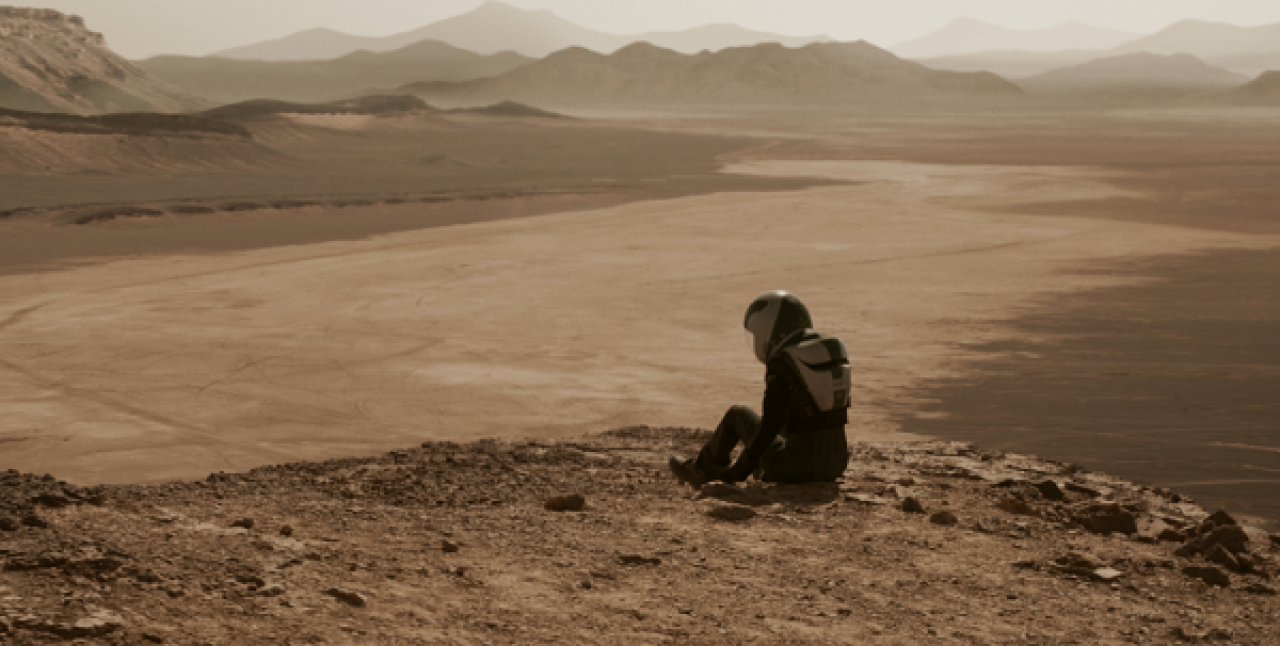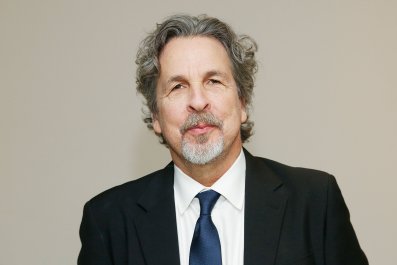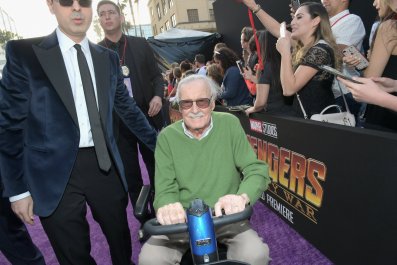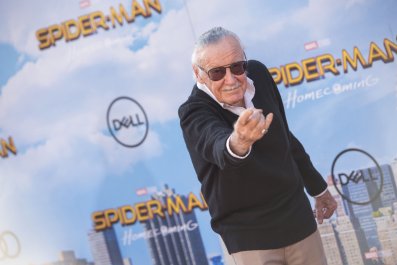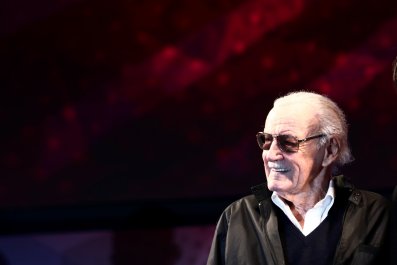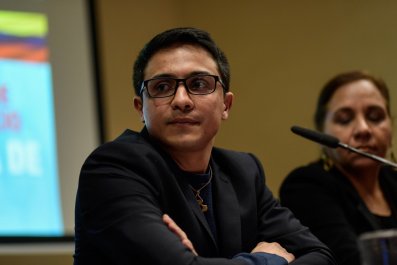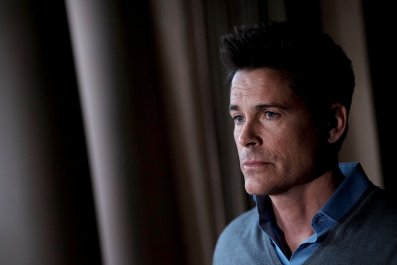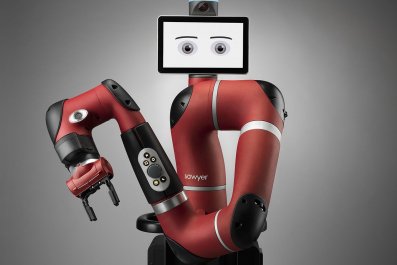Human exploration of Mars is already underway. Elon Musk and the scientists of SpaceX and NASA are preparing for it, and the first human expedition to the red planet is expected to occur within six years if they have it their way.
While the idea of people voyaging to Mars doesn't sound nearly as far-fetched in today's society as it once did, mankind's landing on the planet raises a larger question: What will happen when we get there? Season 2 of the National Geographic Channel's Mars, from executive producers Ron Howard and Brian Grazer, aims to provide an answer.
Following Season 1's uncovering of scientists' efforts to launch life on Mars, the new season of the dramatized docuseries, premiering Monday, will tackle the aftermath of humans' habitation of the planet and the many earthly conflicts that could come with it.
Similar to last year's installment, Mars will feature interviews with prominent figures, such as Musk, Planetary Society CEO Bill Nye, former NASA Chief Scientist Ellen Stofan and several other "Big Thinkers," along with returning cast members Alberto Ammann, Jihae, Anamaria Marinca, Clémentine Poidatz, Sammi Rotibi and Cosima Shaw. New to the series is a slate of actors set to portray the advanced community of Earth transplants living, thriving and stirring up trouble on Mars.
With new achievements and advancements on Mars will come many of the same problems humans struggle to correct here on the blue planet, particularly the difficulty humans have with coexisting. Howard spoke with Newsweek about some of the challenges Mars Season 2 will address, which he hopes can be avoided when people finally do make it to Mars in the future.
The first season of Mars brought in 36 million viewers globally and was Nat Geo's most DVR'd show in the network's history. Were you expecting such a strong viewer reaction to the dramatized documentary style of a show?
You never know. You just never know. The response was probably a little bit better than I hoped, but we were really liking it and feeling good about sharing it. That's usually a good sign, but it's not always reliable. It's definitely been a pleasant surprise the level in which people have taken to the show.
Do you think this is a format we'll see incorporated more in TV in the future?
I don't know, maybe. I've thought about it. We haven't found a subject that we've wanted to put forward with that approach. And here's why it may not be that useful—I think with Mars, what's so significant is, one, the subject is so cinematic and dynamic. And two, you literally cannot do a documentary about [living on] Mars because it hasn't happened yet. Generally, those kinds of intermittent dramatizations [in documentaries] are usually flashbacks. They're usually re-enactments of something that you know has already happened, which just doesn't carry the same potency. What we've found [with Mars is] we can fully invest audiences in the story of the characters and really reinforce it with the documentary coverage, and that's quite different than primarily having a documentary and then having some historical re-enactments. I think it works uniquely well with something as cinematic and adventuresome and futuristic as Mars because it's not really science fiction. It is more futurist—dramatic futurism—but with a human interest component that's really front and center.
Did all the research you guys did for Season 1 come in handy for building storylines for Season 2?
Absolutely, without a doubt. We went into this season with so much more confidence because we had already done a tremendous amount [of research]. We've accrued so much knowledge beyond what we're dramatizing in Season 2. We really knew what we were looking for on the dramatic side, what the potential was and what we were looking for on the documentary side. So it was a huge advantage to have already made the previous six episodes and learn so much about what the Big Thinkers believe the human experience on Mars will be.
Do you think humanity will be able to coexist on Mars in a more peaceful and respectful way than what's happening right now on Earth?
Well, of course, there's gonna be conflicts. You're a long way from Earth. I think the cautionary side of the story of this season is the more that these things can be ironed out and determined before going on the expedition and mission, the better. I think people are certainly gonna have their agendas, and it's naïve to imagine that commercialism won't be a part of it. In fact, it probably has to be. All of those voyages in the 1500s and 1600s were largely paid for by investment groups. They wanted better trade, they wanted resources, etc. Human beings haven't changed all that much. They're going to want a return on their investment beyond just the spirit of exploration and discovery.
If you could be a part of that first group of people to build a community on Mars, would you?
I don't think I would. I've got so much that I'm engaged in here, I think I'd be giving up too much. And I think that spirit, that call to adventure, is not quite that vivid inside my head. Unless they could convince me that somebody had a real need for an amazing IMAX movie that could only be done on the surface of Mars. That would be pretty great.
Is there something that can be learned from watching the show, other than the fact that living on Mars could potentially be a real thing in the future?
I certainly hope that it works as a metaphor for the way we're coexisting and the way we're problem-solving here on Earth. I think that's one of our goals. I also just hope that it will inspire that excitement for the unknown, that excitement for research, for exploration. I think research is a great investment. The more we view [living on Mars] not as a controversial idea but something we're capable of and looking ahead to achieve for all kinds of positive reasons, the better I'll feel about the impact of the show.
What gets you excited about TV and film these days?
The diversity of storylines, the range of cultural influences on storytelling and the wide array of platforms that try to appeal to specific audiences in more specific ways. That all excites me as a director. It expands my own horizon, my own education, my own understanding of how the world works and who inhabits it, and it allows the creative to be all the more ambitious about the kinds of stories they tell and the specific ways they tell them. So to me, it's really an exciting time to be a content creator. I'm glad it's coming along in a moment where I have all this experience behind me and yet a lot of energy and excitement for the work ahead.



